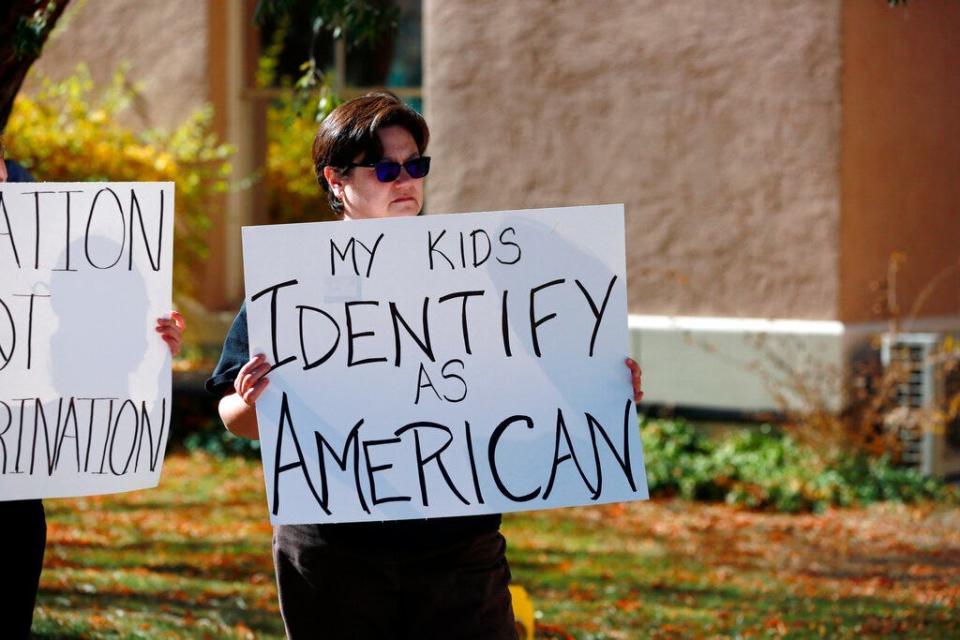West Lafayette school leader: Legislation prohibits teaching 'accurate historical facts'
WEST LAFAYETTE, Ind. – Weeks after being named the next superintendent of West Lafayette public schools, Dr. Shawn Greiner told the district how disturbing he sees possible legislation that would dictate how history would be taught in Indiana classrooms.
Greiner, named superintendent during a Dec. 20 West Lafayette Community Schools Corp. board meeting, said in a letter to the district community that Indiana Senate Bill 167 and House Bill 1134 would "(p)rohibit teaching accurate historical facts, both at the K-12 and collegiate levels."
The bills have been seen as part of legislative attempts nationwide at banning concepts of Critical Race Theory, which looks at racism's part in America's history, policies and laws.
Elsewhere in Indiana: Noblesville superintendent says Senate Bill 167 has 'alarming consequences' for schools
The framework for critical race theory, according to Education Week, dates back 40 years, created by legal scholars Derrick Bell, Kimberlé Crenshaw and Richard Delgado.

The fundamental idea of CRT is that "race is a social construct, and that racism is not merely the product of individual bias or prejudice, but also something embedded in legal systems and policies," wrote Stephen Sawchuk, for Education Week.
Indiana SB 167, one of several "Education Matters" bills discussed in the Statehouse, has since died before a vote in committee after its author, Sen. Scott Baldwin, R-Noblesville, said during public comments the legislation would require teachers to present impartial lessons, even when discussing Nazism.
Baldwin later said, in a letter to the IndyStar, that his intent wasn't that teachers defend Nazism.
“Nazism, Marxism and fascism are a stain on our world history and should be regarded as such, and I failed to adequately articulate that in my comments during the meeting," Baldwin wrote. "I believe that kids should learn about these horrible events in history so that we don't experience them again in humanity.”

The House version contains a ban on "divisive concepts," but would allow teachers to condemn Nazism and other concepts, such as Marxism and fascism. Late Wednesday, HB 1134 passed 60-37, along party lines, in the Indiana House; it was set to be sent to the Senate for consideration.
Such legislation would damage the quality of education provided in Indiana public schools, Greiner wrote to parents.
"Beyond the tremendous disservice this would do to our students, it also may damper the renowned academic reputations of our Indiana K-12 schools, colleges and universities," wrote Greiner, who came to West Lafayette from Southmont schools earlier this month. "With the quality of education in the Hoosier state compromised, our state’s ability to attract residents and economic development could be damaged."
![A woman holds a sign that says "Stop critical race theory" during an anti-mask demonstration in Mishawaka, Ind., on July 30. [ASSOCIATED PRESS/FILE]](https://s.yimg.com/ny/api/res/1.2/IjzRpxeXyETOpskezmnd5w--/YXBwaWQ9aGlnaGxhbmRlcjt3PTk2MDtoPTY3OQ--/https://media.zenfs.com/en/journal-courier/2b6dfdc47d969067bc89f3d997188475)
Greiner told the Journal & Courier lessons shouldn't be altered simply because the facts make students feel uncomfortable.
"This legislation is most alarming because the heart of education and schooling is sharing and teaching multiple perspectives and ideas," Greiner told the J&C after conveying those sentiments in a district letter, "even those that may be uncomfortable.
"If we are ignoring or leaving out facts or concepts, we are not educating our students."
Greiner said Wednesday, before the vote on HB 1134, that he didn't hesitate to communicate such views with a new district and a new set of parents because he had already expressed those views in Southmont.
"If we don't voice it from our perspective, though, it becomes one-sided," he said from the office once held by former superintendent Dr. Rocky Killion. "You can't make decisions if you don't understand what people who are living it, the teachers who are living it, are dealing with. So that's why I felt it was important to send the letter."
State Rep. Sheila Klinker (D-Lafayette) voiced similar concerns Wednesday night, sending a statement to the Journal & Courier moments after HB 1134 passed the house.
"No education bill has caused so much concern, trepidation and fear as House Bill 1134," Klinker said. "Teachers, who are already under enormous pressure to prepare our children for the future, will now have the added anxiety of trying to plan lessons that won't make their students and their parents 'uncomfortable.' It's unsustainable.
"We are going to lose a lot of talented teachers because of this bill. We are already in the midst of a teacher shortage crisis. Our state, our schools, our students, our parents cannot afford to lose any more educators."
Supporters of the legislation, such as Rep. Shane LIndauer (R-Jasper), say it would guarantee that one race or sex isn't promoted over another or that a particular race or sex is inherently racist, sexist or oppressive.
"Parents in our community and across the nation have expressed concerns about divisive concepts like Critical Race Theory leaking into our K-12 classrooms," Lindauer said in a statement posted on the Indiana House Republicans website.
"Students should learn about all of history – the good, the bad and the ugly – but no student should be blamed for what others did in the past. This ideology is polarizing and has the power to divide communities. Indiana classrooms should be a place for all students to learn and succeed, and not be discriminated against for their race or sex."
Deanna Watson is the executive editor at the Journal & Courier. Contact her at dwatson@gannett.com. Follow her on Twitter at @deannawatson66.
This article originally appeared on Lafayette Journal & Courier: West Lafayette school leader: Senate Bill 167 prohibits teaching facts

